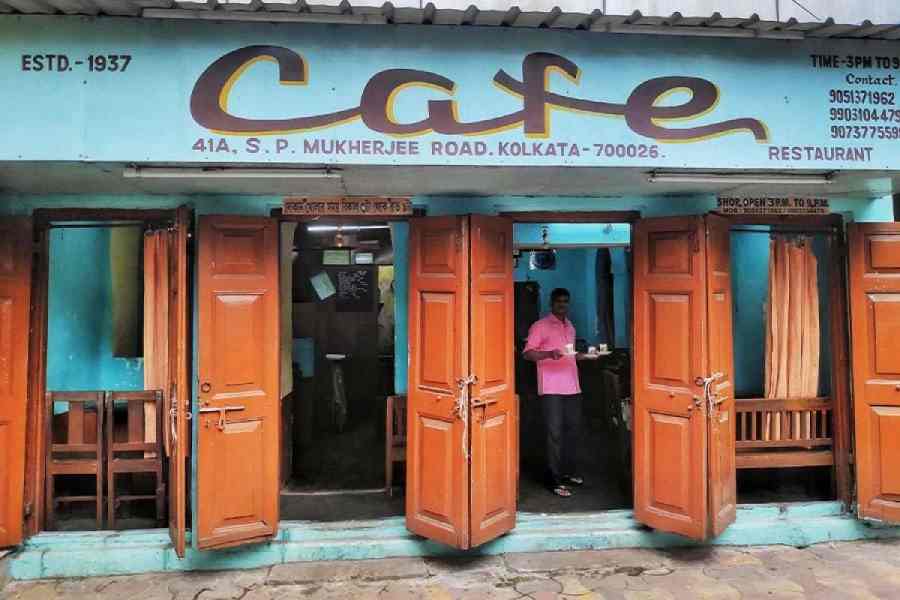Not so hidden
Sir — Everything — from art galleries to trendy cafes — is a ‘hidden gem’ according to social media influencers. The question that needs to be asked here, though, is this: who is it hidden from? Youngsters who have clearly spent most of their lives in their homes surfing the internet seem to think every parar chop’er dokaan, which does brisk business, is a hidden gem because they have little exposure to the outside world. Places like Cafe, Sangu Valley, and Dilkhusha are hardly hidden from Calcuttans. The same goes for places like Boi-chitra Gallery and Golpark’s second-hand book stalls. Generations of people visit these places. Rather than being hidden gems, these places are an inseparable part of the city’s life. Young people should enjoy them without their phone cameras.
Ashok Kumar Kar, Calcutta
Shared resource
Sir — While all eyes are on India and Pakistan and the suspension of the Indus Waters Treaty, another contest over the sharing of water is brewing within the country. The escalating dispute between Punjab and Haryana over water allocation from the Bhakra Beas Management Board is alarming. While Punjab’s concerns regarding its depleted aquifers are valid, physical obstruction of Central infrastructure undermines the rule of law. Both states must exhibit statesmanship and restraint. Provoking public sentiment on such an emotive issue is risky. The Centre should act as a neutral mediator, ensuring that historical grievances do not overshadow present responsibilities. River waters are not political trophies but life-giving resources that must be managed with wisdom, fairness, and cooperation, not brinkmanship.
Satyajit Mallick, Siliguri
Sir — It is deeply concerning to witness the resurgence of hostilities between Punjab and Haryana over river water distribution. History offers grim warnings: the Dharam Yudh Morcha and subsequent insurgencies had devastating consequences. Rekindling tensions through aggressive actions and emotive rhetoric risks destabilising a sensitive border state. The BBMB must remain impartial and all parties should adhere to established norms. The people deserve leadership that seeks equitable and lasting solutions, not performative gestures. Water security can only be achieved through unity and scientific planning, not by repeating the mistakes of past decades.
Priyanshi Dash, Barpeta, Odisha
Sir — The ongoing dispute between Punjab and Haryana has become a political spectacle, overshadowing the plight of farmers on both sides. Agriculture, the backbone of both states, is already reeling from water scarcity, rising input costs, and climate uncertainty. Turning a resource crisis into a political battleground benefits no one. Authorities must prioritise data-driven decisions and transparent dialogue. Farmers deserve access to water based on need not historical animosities or regional one-upmanship. The BBMB and the Centre must ensure that justice prevails without inciting further divisions.
Tousik Rahman, South 24 Parganas
Sir — As the BBMB dispute intensifies, it is essential for the Centre to act swiftly and impartially. Perceptions of favouritism, whether justified or not, could inflame tensions and compromise the credibility of federal governance. It is crucial that the Central government facilitates respectful dialogue between Punjab and Haryana while reinforcing that no state has the right to act unilaterally over national infrastructure. Water sharing must be governed by law, not sentiment. Silence or bias at this juncture could erode public trust in national institutions.
Masihullah Qasmi Pakahi, Lucknow
Sir — It is disheartening to observe political parties in Punjab and Haryana using the water-sharing issue to fan regional sentiments. With Punjab facing severe groundwater depletion and Haryana needing its rightful share, the path forward lies in scientific assessment, fair allocation, and cooperative federalism. Politicians must resist exploiting public emotion for short-term gain.
Amir Zaman, Meghalaya
Historic mistake
Sir — The proposal to reopen the Alcatraz prison as a symbol of ‘law and order’ is deeply troubling. Such a gesture revives memories of harsh, punitive measures and authoritarian ideals rather than addressing modern justice reform. Alcatraz, with its grim legacy, should remain a historical site reminding society of past excesses. The focus ought to be on rehabilitation and humane incarceration. Restoring a notorious prison for political theatre reflects poorly on democratic values. The justice system deserves progressive policies rooted in evidence. But the president of the United States of America, Donald Trump, does not understand this.
Bal Govind, Noida
Sir — Alcatraz was closed for sound reasons: exorbitant costs, severe conditions, and an outdated penal philosophy. Revisiting such a failed model suggests a retreat from more enlightened justice approaches. Public resources would be better allocated towards improving rehabilitation, addressing root causes of crime, and reforming overcrowded prison systems. Romanticising a facility once known as ‘Devil’s Island’ signals a shift towards performative governance rather than meaningful policy. History has taught valuable lessons; reopening Alcatraz would be an act of historical amnesia, not strength.
Mohammad Asad, Mumbai
Travel in style
Sir — The recent viral video of four impeccably-behaved cats travelling to Paris highlights what responsible pet ownership and patient training can achieve. In an age when air travel often brings tales of stress and disruption, this feline quartet provided a refreshing example of calm companionship.
M. Jeyaram,Sholavandan, Tamil Nadu











